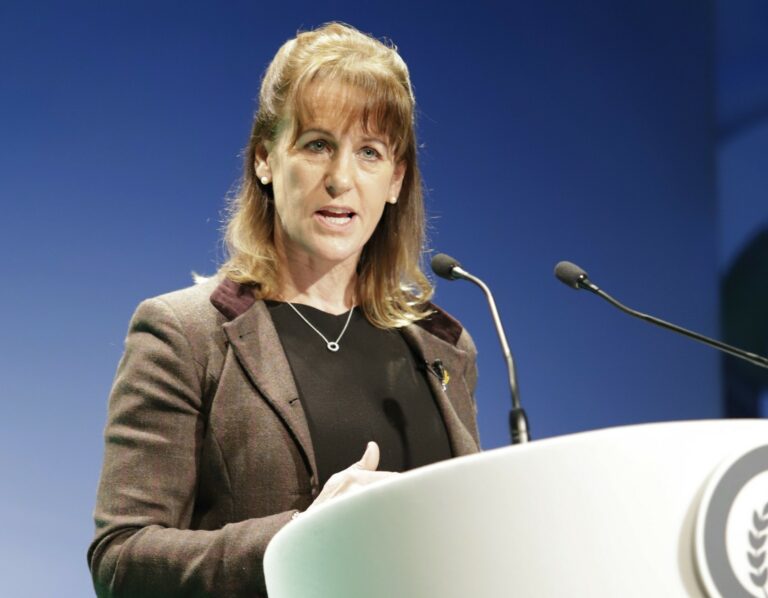NFU President Minette Batters has urged the Government to commit to introducing a food standards commission that scrutinises future trade deals and safeguards British farming’s place as a global leader in climate-friendly food.
Batters made the call to Defra Secretary Theresa Villiers at the Oxford Farming Conference, where she reiterated that the NFU will never accept British farmers being put out of business because of a trade deal that allows imports of food that would be illegal for farmers to produce in the UK.
A new food standards commission must be a fundamental part of how the Government approaches trade deals and backed by legislation in the Agriculture Bill, Batters said. Its primary purpose needs to be the ability to scrutinise proposals in trade deals and make recommendations on the UK’s future food trade policy to ensure that UK farming’s high production standards won’t be undermined, with a requirement for the Government to act on these recommendations.
Batters said: “This year will be the greatest reset for our food and farming system since the 1940s and the decisions made by this Government will be felt for decades to come. We must once again recognise that there is nothing more important to our economy, our health and our environment than the very food we eat.
“One year ago, I declared that British farming could achieve net zero by 2040. The defining factor to reach that goal and help tackle climate change is a willing Government. We are already leading the way in producing climate-friendly food in this country and this Government has a chance to enshrine the UK as global leader in sustainability.
“This all comes back to how we value our food and farming standards. British farmers are world-leading in our standards of animal welfare, environmental protection and food safety. Farmers and the public want it to stay that way, which is why it is crucial that the Government introduces a food standards commission that can scrutinise future trade deals and ensure we do not allow imports of food that would be illegal for our farmers to produce here.
“This needs to be backed in legislation by the Agriculture Bill – which will be so significant for our industry. But I can’t discuss future farming policy without mentioning water. Right now, potentially 50% of our potato crop is still in the ground and only a third of winter crops are planted. This not only reminds us of the unique volatility farmers have to manage year-on-year, but it also masks the fact that we face huge challenges in managing water in the years ahead.
“The first domestic agricultural policy in over 70 years must address how we manage water in this country. We are currently wasting one of our most precious natural resources and we need a revolutionary approach to how we plan, protect and pay our farmers to store water.
“There is Government commitment to spend an additional £100 billion on public infrastructure over the next five years but we need to revolutionise our approach as to how we build better water infrastructure and power the change needed, as well as alleviating the flood risk which we have seen devastate so many communities.
“To reach our sustainability goals, we need to see a Government join British farmers on their mission to be the most sustainable farmers in the world. We stand ready to work with them to make that happen.”
Batters also urged the Defra Secretary of State to use the Agriculture Bill to provide financial stability for farmers and improve the functionality of our supply chain.
Going against tradition by opting to speak last, after the NFU’s president Minette Batters, Defra secretary of state Theresa Villers said the government heard loud and clear the message coming from food and farming.
“Backing better standards is a core part of our Brexit policy,” Villers said. “I will continue to work with you Minette as these negotiations progress, and make sure your voice is heard. We will not imperil our domestic and international reputations. Our strong British brand is built on high standards to which we hold ourselves.”
Addressing directly concerns that a US trade deal could lead to imports of food that would be illegal to produce in the UK, Villers said: “We will not dilute our strong environmental protections, food safety and animal welfare. Even limited access to our markets is a big prize to aspire to. The government will defend our national interest strongly and will be prepared to walk away if that is in our national interest.”


